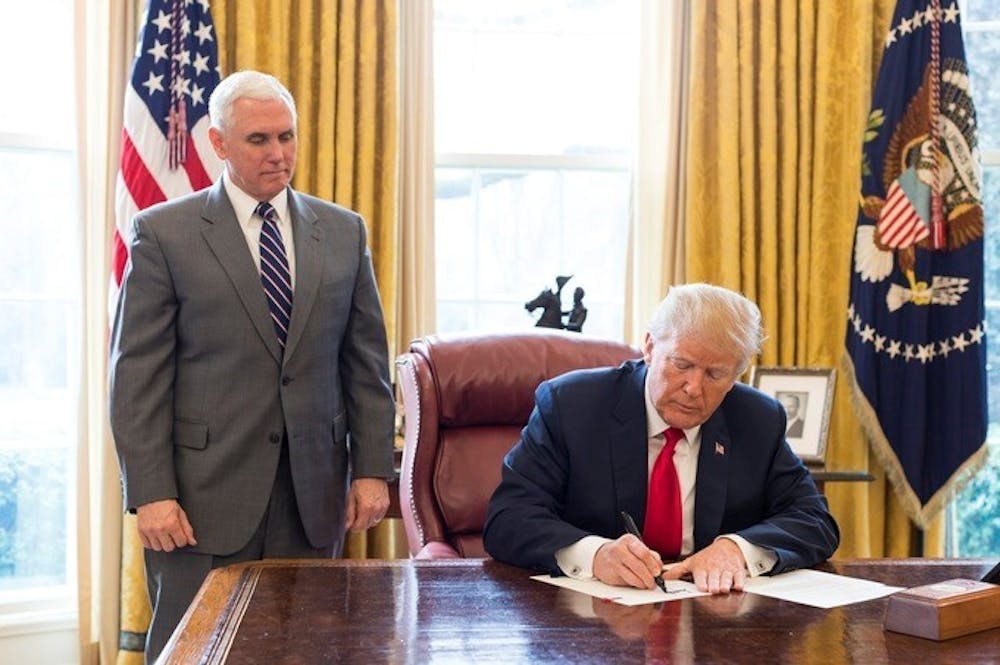On Feb. 19, Hayden Williams — a representative of a group that provides training for conservative campus groups — was assaulted by Zachary Greenberg, an Oakland resident, at the University of California, Berkeley. Though, according to the New York Times, neither man was a student at the university, free speech on college campuses is often a popular topic in the news, and the recent event that unfolded at the U.C. Berkeley has once again brought it to the attention of the American media.
President Trump used this altercation as a catalyst to announce his plans for an executive order that attempts to protect free speech on college campuses. Trump claimed that the executive order would withhold federal funding from universities that do not protect free speech.
While free speech is certainly a part of the constitution that must be respected, the executive order suggested by Trump is both unnecessary and counterproductive.
The proposed executive order would affect both public and private universities, including the University. According to the Office of the Dean for Research, “Most of [Princeton] University’s research funding comes from federal agencies, with companies, foundations, and other private entities becoming increasingly important sources of support.” If President Trump were to sign his proposed executive order, the University would be just one of many affected American universities.
The vague executive order suggested by Trump is unnecessary. The first amendment already guarantees free speech at public universities and private universities, by nature, should not be under government control. According to the Foundation for Individual Rights in Education (FIRE), most private universities pride themselves in supporting free speech, yet “if a private college wishes to place a particular set of moral, philosophical, or religious teachings above a commitment to free expression, it has every right to do so.”
Private universities are allowed to have their own rules when it comes to freedom of expression. Students are free to decide which college they want to attend; it is up to individual students to choose a university where freedom of expression is practiced according to their preferences.
Public universities, on the other hand, are subject to government control and therefore already must follow national freedom of speech laws. An executive order on the freedom of expression would be redundant legislation that, in reality, is just an attempt by Trump to please his conservative supporters.
Trump’s declaration of his plan to sign the executive order is incredibly vague and clearly just an unwise reaction to the assault of a Trump supporter. When describing the executive order, Trump said, “If they want our dollars, and we give it to them by the billions, they’ve got to allow people like Hayden and many great young people, and old people, to speak.”
The specific incident that Trump used to justify the executive order did not even include any Berkeley students; both Hayden and his assailant were simply two men who happened to be on the Berkeley campus. Therefore, U.C. Berkeley does not have any real jurisdiction over these men. Regardless of the lack of connection to the university, Chancellor Carol Christ and Vice Chancellor for student affairs Stephen C. Sutton of U.C. Berkeley wrote to the campus community: “[Violence and harassment] is intolerable and has no place here. Our commitment to freedom of expression and belief is unwavering.”
While Republican groups argued that this response was too delayed, the university still responded to the incident and Zachary Greenberg has been charged with three felonies. Without any real reasoning, Trump is using this incident in an attempt to appeal to conservatives who feel that their freedom of expression is not being adequately protected on college campuses.
Not only is the proposed executive order superfluous, but it would actually hinder true freedom of expression.
It is unclear as to how exactly Trump plans to impartially determine which universities violate his rules against free speech and therefore would not receive federal funding. The United States already has a court system to deal with free speech on public college campuses, and private universities have their own mechanisms. Adding an executive order would only complicate already established procedures.

University of Chicago president Robert Zimmer, told the Observer that “a committee in Washington passing judgment on the speech policies and activities of educational institutions, judgments that may change according to who is in power and what policies they wish to promulgate, would be a profound threat to open discourse on campus.” Zimmer’s concerns are completely valid. College campuses are supposed to be centers for intellectual debate, and discussions on college campuses should not be mandated by whatever political party is in office.
Despite President Trump’s declared commitment to support the freedom of expression, his unjustified proposed executive order would actually threaten the free speech that he claims to value so dearly.
Katie Goldman is a first-year from Western Springs, IL. She can be reached at kpg3@princeton.edu.








